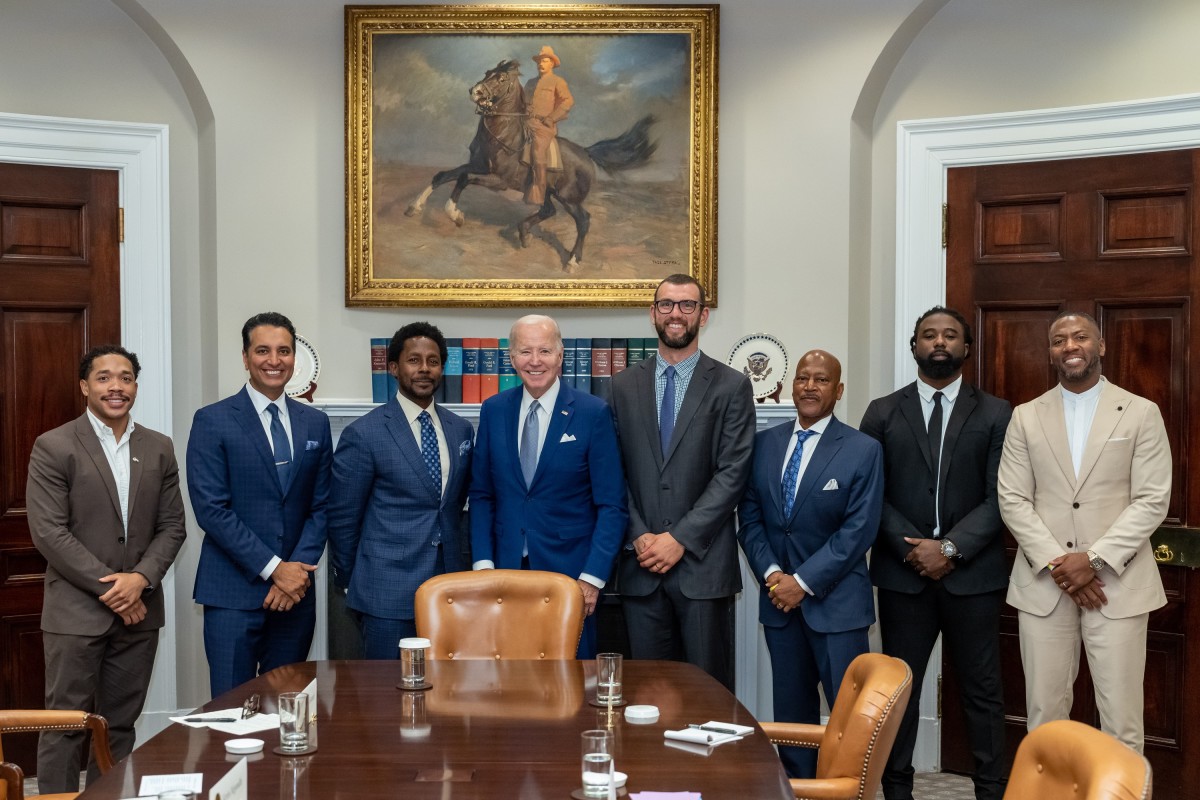President Biden Meets With Former NCAA Football Players Over College Athlete Rights

President Joe Biden and other White House officials met with multiple former college football players on Wednesday to discuss the working rights of college athletes, an unprecedented show of support for players in the battle over the status of so-called “student-athletes,” one of the longest running and most contentious debates in American sports.
According to an administration official, the roundtable discussion was convened because “college football players—and all student-athletes—deserve consistent safety standards, to have a voice, and to benefit from the revenue they produce[.]”
In attendance were Rod Gilmore, Desmond Howard and Ryan Clark, all now commentators at ESPN, as well as broadcaster Kevin Neghandi from the network. Gilmore was a two-sport athlete at Stanford, Clark played safety at LSU, and Howard played receiver at Michigan. Former Stanford quarterback Andrew Luck was also on hand, as was Jordan Meachum, a representative from the College Football Players Association and former running back at Sacred Heart and South Dakota State, and former Georgia running back Keith Marshall, co-founder of NIL media platform The Players’ Lounge.
It was certainly a different type of day at the White House. One off-duty Marine sentry near a door to a West Wing entrance pointed out “that’s Andrew Luck,” while other Secret Service members peeked out of the window to catch a glimpse of Howard, the 1991 Heisman Trophy winner.
What was originally supposed to be a drop-in during the roundtable by the president ended up being about an hour spent with the players. After engaging them in the roundtable, Biden took them on a 20–30 minute tour of the White House, including the Oval Office. (Biden did not address or take questions from the press.)

Biden did not stake out specific positions on hot-button issues like NIL or whether athletes should be classified as employees and receive regular salaries, according to the attendees Sports Illustrated spoke with, but they said his support for the players and their rights was clear.
“For him to give us a tour and tell us about the different history that's a part of his office and why it is, I think, is one of those times where you actually understand and feel like that they are serving the people,” Clark said. “And so I thought it was a really good thing. I thought that his attention to what we were saying, and the passion that, whether it was Rod, Desmond, Kevin showed for the young student-athletes was amazing. I think it was palpable and tangible in that room, and hopefully something comes of it.”
The roundtable meeting was described by National Economic Council director Lael Brainard as an opportunity to learn about the pressing issues in college athletics. Most of the remarks were made behind closed doors, but the meeting was open to the press for a brief period.
“As the landscape of college football changes and the revenue grows exponentially, we just wanted to make sure we had a conversation, that you all have been leading on thankfully, making sure players are protected not just in the short term but in the long term. But as money grows, making sure there’s not a significant power imbalance,” said Steve Benjamin, director of the Office of Public Engagement Director, in his introductory remarks.
Meachum said that most of the focus both in the roundtable meeting itself and with Biden centered around health and safety for athletes and making sure the environment around athletics supports them both during and after their playing careers. NIL and athlete compensation was also discussed. Potential avenues for revenue sharing were broached, at a baseline level with the president, and his posture was described as “supportive” by Meachum.
“I think for us, we see this as an organizing jumping off point to what we’ve got coming in 2024, so I feel like it’s kind of setting the table for that,” CFBPA executive director Jason Stahl told SI after the meetings concluded. “Are we gonna have tangible reform ideas come out of the White House? Probably not. But I think we greatly appreciate the White House staff that saw us as doing this organizing work and really want to elevate the work we’re doing and we’re super appreciative because that’s gonna happen as a result.”
Athlete unionization and the potential of athletes being employees of their schools were not discussed with Biden in detail.
“College athletes are an essential part of American culture, starting a conversation about it and making sure athletes are protected and are put in an environment where they get what they deserve and care longterm,” Marshall said when asked by SI what Biden said regarding why he was interested in the issue. “I think it fits in line with some of the larger labor considerations that are being had as well, but he seemed genuinely interested.”
For Biden, it was the latest in a series of shows of support for the labor movement. He recently threw heavy support behind the United Automobile Workers during their strike, counting their new contracts, with large wage increases, as a political victory. The meeting on Wednesday came amid a number of world crises, including the ongoing conflict in the Middle East.
It remains to be seen how much the Biden administration or Congress will engage on the issue of athlete compensation, even beyond name image and likeness, going forward. If a bill does not emerge from Congress by the end of the calendar year, it’s likely the issue will be put aside by lawmakers until 2025 after the next year’s presidential election. Change could come from the court system via one of the multiple lawsuits in progress or a pending National Labor Relations Board ruling on whether private school athletes can be made employees.
